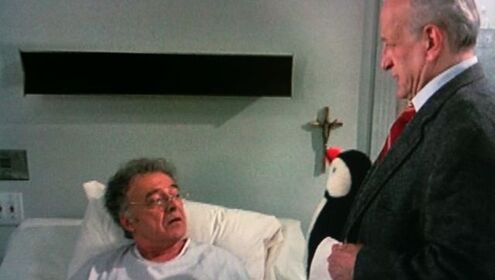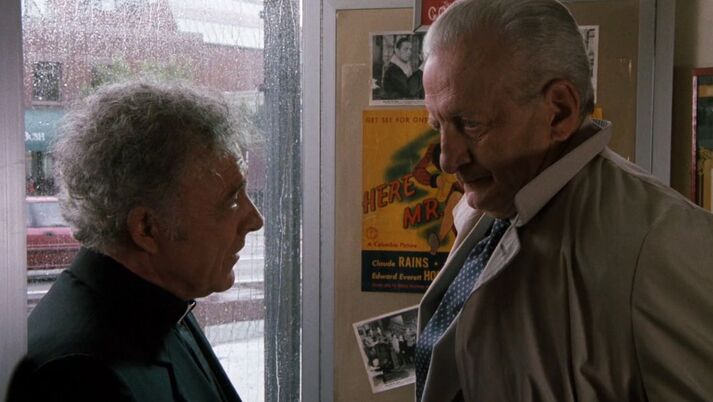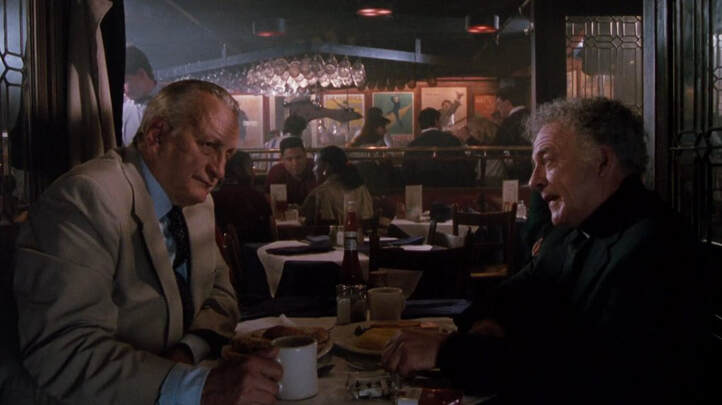A Penguin for Your Thoughts: 'The Exorcist III' and the Need to Normalize Positive Male Friendships8/19/2020  Do me a favor… …Take a step back for a second and think to yourself: How often have I seen men actually cry for each other in horror movies? And how often have I seen a man give another man the most adorable stuffed penguin ever during a hospital visit? You probably can’t think of many examples right off the top of your head. For the longest time, horror films, like every other genre, commercial, and countless other pieces of societal brainwashing, have reflected a society which teaches us that men are supposed to be strong. Men aren’t supposed to show emotion publically. And we sure as shit aren’t supposed to cry. Growing up though, I was a cryer. I never would’ve admitted that ten years ago. Crying cost me any sense of “popularity”, and led to my ass being bullied until the crying was laughed, and beaten, out of me. Between that and the daily pressures put on men to “be tough,” I eventually stopped crying at all. Any time I used to visit my great grandmother, she would give me a quarter and let me talk to her about horror. She was the sweetest old woman, and I loved her. Yet when she died, I was the last to mourn her in my family. While everyone else cried into each other’s shoulders, I had no expression, not until I saw her in her coffin, and let it all out. By myself, of course. My stepmom recently passed away after a short battle with cancer, another person I loved dearly, and yet I didn’t shed a single tear until I was alone one night, driving home from work. I’m not saying that society is responsible for that. But I’m also not letting society off the hook, either, because we need more examples of men expressing their sensitivity to show that sensitivity is okay. There’s a reason that stress causes men to live shorter lives than women, and according to an article published by the BBC, the suicide rate of men is at least three times higher than women around the world. As they imply, it’s too simplistic to say that it’s because men tend to bottle things up, but there’s something to be said for the idea that men are taught not to talk about their issues and just “deal with it”. The “be a man” mentality that’s drilled into the heads of young boys growing up…it’s all bullshit. And it’s why William Peter Blatty’s The Exorcist III (1990) deserves to be celebrated. After the laughable failure that was Exorcist II: The Heretic, Morgan Creek Entertainment brought back William Peter Blatty (who had written the original film, based on his book), to write/direct what he had first pitched to the studio after the success of The Exorcist, a film based on his novel, Legion, which sees the Detective Kinderman character return (this time played by George C. Scott), as he investigates a series of murders that bring him back to an old friend…an old friend who just happens to be the long-dead Damien Karras (once again played by Jason Miller), who is now possessed by a horde of demons, including the Gemini Killer (Brad Dourif). The film features a chilling atmosphere, a soundscape which creeps under the skin, and arguably Brad Dourif’s greatest performance, one that is so mesmerizing, I could watch him wax poetically with George C. Scott for hours. And remember, we’re talking about the guy who voices Chucky in the Child’s Play series here, so that’s saying something. But the thing that really makes the film stand out? The close male bond between Kinderman and Father Dyer (Ed Flanders). Our introduction to Kinderman in the film is him pouring over a photo of Karras while having himself an early morning drink. The first word out of his mouth is “Damien.” The core villain of The Exorcist III isn’t the demon that resides inside of Karras’ body. It’s what it represents. The despair that Kinderman and Dyer still feel fifteen years after Karras’ death, and the anguish which eats them up inside every time they think of their lost friend. Which is why it’s so important that the two of them have each other. Early in the film, Kinderman and Dyer are each on their way to see one another, but they won’t admit the real reason why. Father Dyer says to another priest, “every year on this day, he (Kinderman) gets depressed and I try to cheer him up”. Meanwhile, Kinderman is telling his wife “today is my day to cheer up our friend Father Dyer.” Both men are willing to acknowledge that this anniversary of Damien’s death is an important day, but what they’re not willing to say is that each of them needs each other’s understanding shoulder to cry on, so to speak. Kinderman and Dyer don’t spend their day out drinking over Damien and indulging bad habits. Like good friends do, they distract each other. They talk about the world. They bicker over lemon drops because Kinderman is worried about missing the movie they’re seeing. But then there’s the Carp speech. Kinderman’s endless rant about a carp at home in his bathtub. I’ve often heard the speech referred to as “unnecessary”, but it’s actually one of the most important moments in the film. Because that speech isn’t really about a carp at all. The underlying message is that Kinderman doesn’t want to go home. On this anniversary, of all days, he needs the shared kinship of his best friend. And as we see later, when Dyer gets Kinderman to open up about what’s troubling him (the murders), a thing his wife wasn’t able to do earlier when she asked how he was, it becomes clear that Dyer is the only one on the planet that Kinderman feels this comfortable with. We just don’t see this kind of friendship among men in horror films that often, and it’s a shame. Not that we don’t get good male friends in horror, but more often than not, their friendships are nothing as real or honest as this. Most of the time, male bonds in horror are based around one thing: sex. It’s always about trying to get laid, get each other laid, or making fun of the other guy for not getting laid. You’ll almost never see men in horror cry, and you’ll definitely almost never see them show much sentimentality with each other. Kinderman handing Dyer a stuffed penguin while he’s in the hospital is one of the sweetest things I’ve ever seen one man do for another in a horror film, and we’re talking about two older adults who grew up in a time where a simple act like giving another grown man a stuffed animal would’ve been considered absurd, and that’s putting it nicely. In the 90s, if I’d brought my friend a stuffed penguin for his 13th birthday, the name-calling I’d have received from the other kids would’ve been ruthless. Young boys need to see that it’s okay to be sentimental. They need to see that it’s okay for a grown man to cry, the way Kinderman does later in front of his peers after Dyer has died. Notice how the other man understand, instead of giving him crap and telling him to toughen up. As that kid that cried all the time, I needed to see that, to know that there was nothing wrong with me being so expressive. Too often we see in films men being told to be tough, don’t cry, be a man, and too often we’ve had our fathers tell us the same. But being a man isn’t withholding tears, or avoiding showing someone that you love them for the sake of looking tough. Being a man is showing someone that you can and will take care of them, because you love them. That’s a message that rings even louder when we see it with two grown men showing each other how much they value one another, as Kinderman and Dyer do. It’s the year 2020, for fuck’s sake, yet this toxic mentality is still everywhere we look. Movies are influential. They matter. So for the sake of all of the still budding horror fans out there who need to see the acceptance of male sentimentality, it’s time we start normalizing that sort of behavior in our horror. I’m tired of seeing the two dudes who only care about getting each other laid. Show me the two grown men who are okay with hugging and crying on each other’s shoulders without looking annoyed. We need more of that. We need more men like Kinderman and Father Dyer. By Matt Konopka
1 Comment
B
7/27/2021 05:56:00 am
So glad you wrote this. Exorcist III does not get enough love and the Kinderman/Dyer relationship is 100% fueling the first half of this movie. Douriff carries the other half and the Damien/Kinderman dynamic is another article in itself. Thanks!
Reply
Leave a Reply. |
Archives
March 2023
|


 RSS Feed
RSS Feed